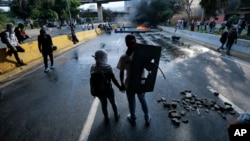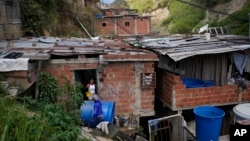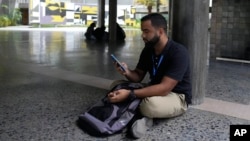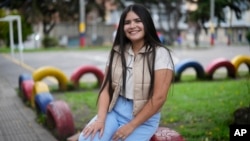Victoria Estevez finally met someone who saw past her shyness. They spent two months learning about their likes and dislikes, texting about their families and friends, and walking around their hometowns on Venezuela's Caribbean coast. On a trip to the capital in December, they held each other for the first time.
I-like-yous followed, and by February, they were calling it a relationship.
And then came heartbreak.
“Remember I had told you that I have a brother in the Dominican Republic? Well, I am going to leave the country, too,” Estevez, 20, recalled reading in an early March WhatsApp message from her new boyfriend. He was the second guy in a row to blindside her with imminent plans to emigrate.
Nothing, not even love, has been spared the uncertainty that plagues everyday life in crisis-ridden Venezuela, which has seen several million people leave in the last decade or so. As a presidential election looms this month along with questions about Venezuela's future, many more are considering emigrating, wreaking havoc on the country's economy, its politics and its dating scene.
Young people are debating online and among themselves whether it's worth it to start a relationship — or whether to end one. Others are wondering when it is too soon or too late to ask the crucial question: Will you leave the country?
In a country rife with instability, dating is not spared
The last 11 years under President Nicolás Maduro have transformed Venezuela and Venezuelans.
In the 2000s, a windfall of hundreds of billions of oil dollars allowed then-President Hugo Chávez's government to launch numerous initiatives, including providing ample public housing, free health clinics and education programs.
But a global drop in oil prices, government mismanagement and widespread corruption pushed the country into the political, social and economic crisis that has marked the entirety of his successor's presidency: Decent paying jobs are rare. Water, electricity and other public services are unreliable. Food prices have skyrocketed.
The country that once welcomed Europeans fleeing war and Colombians escaping a bloody internal conflict has now seen more than 7.7 million people flee its shores. The government now faces its toughest test in decades in a July 28 election.
Accountant Pedro Requena has seen many a friend leave, but the news hit differently when the woman he had spent three “incredible” months dating in 2021 told him she was moving with her mom to Turkey. Requena, 26, was swooning over her, but he was committed to finishing his university degree and did not consider migrating.
With no guarantee of when they could visit each other, they still decided to give long-distance a try. They woke up early or went to bed late so that they could have video calls despite their seven-hour difference. They watched movies and TV shows simultaneously. They texted and texted and texted.
“Venezuelans adapt to anything," he said. "The crisis changes you.”
Indeed, Venezuelans adapted their diets when food shortages were widespread and again when groceries became available but unaffordable. They sold cars and switched to motorcycles or stopped driving, when lines at gas stations stretched kilometers. They stocked up on candles when power outages became the norm. They used the U.S. dollar when the Venezuelan bolivar became worthless.
But that unpredictability is disastrous for forming lasting bonds.
“The political instability actually introduces the instability into the relationship or into dating in general,” said Dr. Amir Levine, a psychiatrist and research professor at Columbia University.
A disillusioned generation
For many of the young people fleeing Venezuela now, migration was not their first choice. First, they protested, standing on the front lines of massive anti-government demonstrations in 2017, when they were students.
The movement was met with repression and sometimes deadly force — and nothing changed: Maduro is still president, well-paying jobs are nonexistent, and a car, a house and other symbols of adulthood did not materialize for this generation.
Now, instead of planning demonstrations, they plan one-way trips abroad.
Half of Kelybel Sivira's graduating class from law school — including people involved in the protests — has left the country.
The 29-year-old commercial lawyer reconnected online with a former classmate in May 2021, after he had already emigrated to the U.S. with his family. Their friendly conversations turned romantic, and they began to consider a relationship toward the end of 2022.
They have not seen each other in person for years. He is seriously considering returning to Venezuela in August regardless of the election outcome. She does not want that.
“I’m afraid that he will return to the country and say, ‘Venezuela, I still hate you. This is not what I want,’” Sivira said. “I don’t want to feel guilty.”
Requena is also in a kind of limbo. Though he and his long-distance girlfriend decided to see other people, he still longs for the person he said was his perfect match.
“We keep in touch. The affection is always present,” he said. “It ended, but the future is uncertain, and even more so with this country.”







